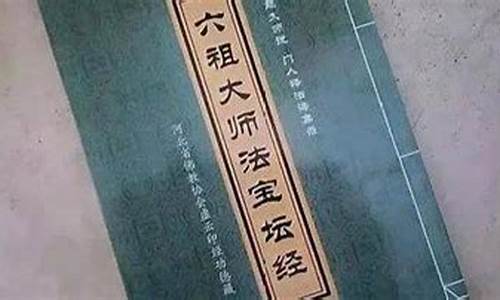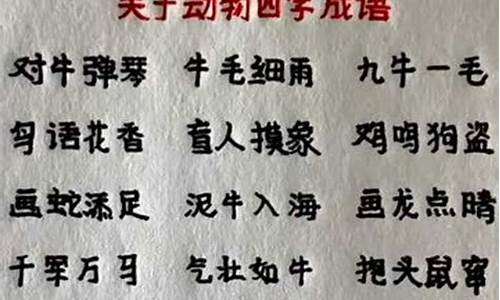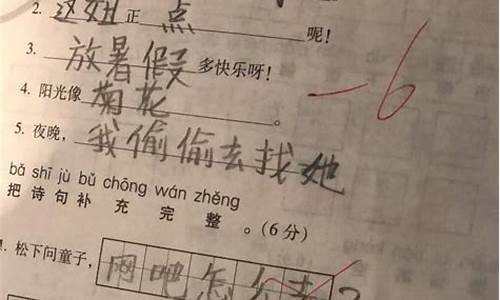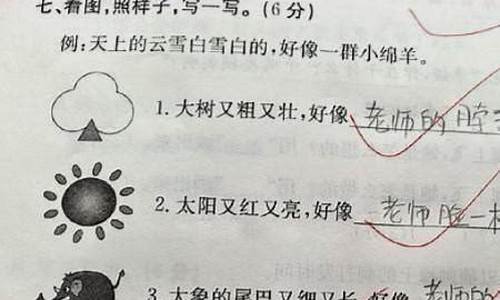成语故事 英语版_成语故事英语版短篇
感谢大家给予我这个机会,让我为大家解答成语故事 英语版的问题。这个问题集合囊括了一系列与成语故事 英语版相关的问题,我将全力以赴地回答并提供有用的信息。
1.英语的成语故事
2.求四个字的成语故事英语的
3.少儿简单英语成语故事带翻译:狼狈为
4.少儿英语成语故事:自相矛盾
5.少儿英语成语故事:毛遂自荐
6.优秀经典成语故事中英双语?
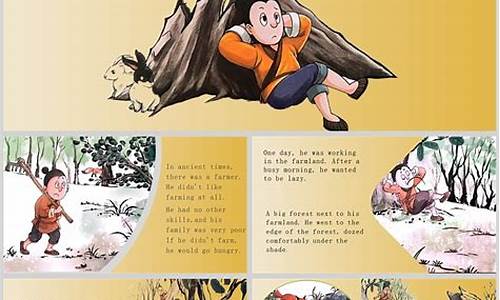
英语的成语故事
亡羊补牢------Mend the fold after the sheep he been stolen
守株待兔------Wait every day under the tree, in the hope that a hare would kill itself by crashing into a tree trunk
坐井观天------Limited outlook
程门立雪------Stand in the snow to wait upon Master Cheng respectfully
入木三分------Penetrating
完璧归赵------To return a thing intact to its owner
负荆请罪------To offer a humble apology
凿壁借光------Bore a hole on the wall in order to get some light from the neighbour's house
乐不思蜀------He much enjoyment and forget to go back home
草木皆兵------State of extreme nervousness
马革裹尸------Die on the battlefield
闻鸡起舞------Rise up upon hearing the crow of a rooster and practise with the sword
买椟还珠------Show lack of judgment
南辕北辙------Act in a way that defeats one 's purpose
楼主够了吧!不够跟我说哦!!
求四个字的成语故事英语的
一.刻舟求剑Making His Mark A man from the state of Chu was crossing a river. In the boat, his sword fell into the water. Immediately he made a mark on the boat. "This is where my sword fell off," he said. When the boat stopped moving, he went into the water to look for his sword at the place where he had marked the boat. The boat had moved but the sword had not. Is this not a very foolish way to look for a sword? 战国时,楚国有个人坐船渡江。船到江心,他一不小心。把随身携带的一把宝剑掉落江中。他马上掏出一把小刀,在船舷上刻上一个记号,说:“这是我宝剑落水的地方,所以我要刻上一个记号。” 船靠岸后,那楚人立即从船上刻记号的地方跳下水去捞取掉落的宝剑。捞了半天,仍不见宝剑的影子。其实他又怎么找得到宝剑呢?船继续行驶,而宝剑却不会再移动。像他这样去找剑,真是太愚蠢可笑了。 二 守株待兔Staying by a Stump Waiting for More Hares To Come and Dash Themselves Against It Staying by a Stump Waiting for More Hares To Come and Dash Themselves Against It This story took place more than 2,000 years ago,in the Warring States period(475-221 B.C.).Tradition has it that in the State of Song at that time there was a man who was famous for staying by a stump waiting for more hares to come and dash themselves against it. He was a yong farmer,and his family had been farmers for generations.Year after year and generation after generation, farmers used to sow in spring and harvest in autumn,beginning to work at sunrise and retiring at sunset.In good harvest years,they could only he enough food to eat and enough clothing to wear.If there was a famine due to crop failure,they had to go hungry. This young farmer wanted to improve his life.But he was too lazy and too cowardly.Being lazy and cowardly over everything,he often dreamed of hing unexpected blessings. A miracle took place at last. One day in late autumn,when he was ploughing in the field,two groups of people were hunting nearby.As shoutings were rising one after another,scared hares were running desperately.Suddenly,a blind hare dashed itself headlong against the stump of a dead tree in his field and died. That day,he ate his fill. From that day on,he no longer went in for farming again.From morning till night,he stayed by that miraculous stump,waiting for miracles to take place again. This story comes from"The Five Vermin"in The Works of Han Feizi.Later generations often use the set phrase"staying by a stump waiting for more hares to come and dash themselves against it"to show grusting to chance and windfalls or dreaming to reap without sowing.It is also used to show adhering to narrow experiences and not being able to be flexible. 相传在战国时代宋国,有一个农民,日出而作,日入而息.遇到好年景,也不过刚刚吃饱穿暖;一遇灾荒,可就要忍饥挨饿了.他想改善生活,但他太懒,胆子又特小,干什么都是又懒又怕,总想碰到送上门来的意外之财。 奇迹终于发生了。深秋的一天,他正在田里耕地,周围有人在打猎。吆喝之声四处起伏,受惊的小野兽没命的奔跑。突然, 有一只兔子,不偏不倚,一头撞死在他田边的树根上。 当天,他美美地饱餐了一顿。 从此,他便不再种地。一天到晚,守着那神奇的树根,等着奇迹的出现。 成语“守株待兔”,比喻亡想不劳而得,或死守狭隘的经验,不知变通。 "An illusory snake in a goblet" is used to describe the psychological state of being frightened caused by taking illusions as reality. “杯弓蛇影”比喻把虚幻当作真实的恐惧心理。 ------------------------------------------------------- In Jin Dynasty there was a man named Yue Guang who was fond of drinking alcohol. 晋朝有个叫乐(yuè)广的人,爱喝酒。 One day, he invited a friend to his house to drink together. 一天,他邀请朋友到家里来对斟(zhēn)对饮。 Suddenly, his friend saw the reflection of a snack swimming in the goblet. 忽然,朋友看见酒杯里有条蛇影在游动。 He got so much frightened that he took ill on bed after getting home. 他受了惊吓,回去便一病不起。 And neither any doctor or any medicine could cure his illness. 请医服药,都无起色。 Yue Guang came to see him and asked about the cause of his disease. 乐广跑来看他,问明起病的缘由。 When he got to know the cause, he pulled his friend from the bed immdiately and took him to his house. 乐广听后一把拉起朋友往家走。 Yue Guang made his friend sit where he used to, pouring a goblet of alcohol for him, and asked him," Is there any snake reflection in the goblet?" 他让朋友坐在原处,斟满酒问:“有蛇影吗?” There was still a "snake reflection" in the goblet! Yue casually took away the bow hanging on the wall. 杯子里还有“蛇影”!乐广随手取下墙上的弓。 This time, the "snake reflection" diseared. 这次,“蛇影”不见了! "So it was the bow reflection that was in the goblet!" His friend at once got well from his illness. “杯子里原来是弓影呀!”朋友的病情顿时好了! 天衣无缝 There was a man called Guo Han in the Tang Dynasty(618-907).One summer night, when the moon was very bright he suddenly saw a girl descending slowly from the sky. He observed the girl closely, and found that the dress she was wearing was seamless. He was puzzled, and asked why. The girl answered,"Heenly clothes are not sewn with needle and thread." This idiom is used metaphorically to indicate the flawless handling of things. It can also be used to indicate a perfectly written poem or other literary article. 唐朝有个人教郭翰。一个夏天的晚上,月光非常明亮,他忽然看见天空中有个女子轻盈而缓慢地飘落下来。他仔细地观察那个女子,发现她身上穿的衣服连一条缝也没有,感到非常奇怪,便问那个女子。女子回答说:“天衣本来就用不着针线缝合的呀!” 这个成语用来比喻处理事情十分周密,不露一点痕迹。也比喻诗文写得很精辟,找不出一点毛病。 一丘之貉 In the Han Dynasty, there was an official called Yang Yun who was both capable and honest. Commenting on the assassination of a king of a small state, he said, “If a king refuses to follow the advice of a wise minister, he will suffer an unitimely death. The emperor of the Qin Dynasty trusted treacherous ministers, and therefore lost his state.” He compared kings and emperors to racoons living on the same mountain. This idiom refers derogatorily to people who are of the same kind. 汉朝时,有个叫杨恽的人,在朝廷做官,廉洁无私,有很有才能。有一次,他听说一个小国王被杀死,就发表议论说:“君王不纳贤臣的计策,就会得到这种下场。秦朝皇帝宠信奸臣,所以亡国;如果重用贤臣,他的国家就不会灭亡了。”他最后总结说,古今的帝王都不过是一个山丘上的貉而已。 这个成语比喻某些人彼此相同,或者都是坏人。 黔驴技穷 从前,贵州没有驴子,有人从外地带回一头驴子,拴在山下,一只老虎看到了,以为是什么怪物,急忙躲到树林中去头头地瞧。驴子大叫一声,老虎吓了一跳,以为驴子要吃掉自己。时间一长,老虎觉得驴子没有什么恶意,逐渐走近去戏弄它,触犯它。驴子生气了,用蹄子踢老虎。老虎心里想:“你的本领不过就是如此啊!”于是立刻扑过去,一口把它咬死吃掉了。 这个成语比喻仅有的一点本事也用完了,在没有别的办法了。 The Guizhou Donkey Has Exhausted It's Tricks In ancient times there were no donkeys in Guizhou province. Somebody brought a donkey from somewhere and tied it to a tree at the foot of a mountain. A tiger saw the donkey, and thought that it must be a fearsome monster. It hide behind a tree and spied on the donkey. When the donkey brayed, the tiger was frightened, thinking that the donkey was about to devour it. After a while, seeing that the donkey had not moved, the tiger roached it and teased it. The donkey became angry, and kicked the tiger. The tiger thought to itself:"It then all it is capable of?" It then jumped on the donkey and ate it. This idiom is used to mean that one has exhauseted one's skills.
少儿简单英语成语故事带翻译:狼狈为
Amazing the World with a Single FeatIn the Warring States Period, Duke Wei of Qi neglected state affairs, for the first three years of his reign, giving himself over to dissipation. One of his minister, Chun Yukun who had a good sense of humour, said to him:”There is a big bird which has neigher taken wing nor sung for three years.” The duke answered, “Once that bird starts to fly and sing, it will astonish the world.” The duke thereupon devoted himself to his duties and built his state up into a powerful one.This idiom is used to indicate that a person may rise from obscurity and achieve greatness.战国时代,齐威王即位后作了三年国君,只顾享乐,不理政事。有个善于说笑话的人叫淳于髡,一天对齐威王说:“城里有一只大鸟,三年不飞也不叫,你知道这是什么道理?”齐威王说:“这鸟不飞则罢,一飞就冲天;不鸣则罢,一鸣就惊人。”在淳于髡的激发下,齐威王开始治理国家,取得很大成绩,齐国的声威一直保持了几十年。
少儿英语成语故事:自相矛盾
be tarred with the same brush
A wolf and a jackal often went hunting together.
Once they came to a sheepfold, the walls of which were too high for them to get over.
Then the wolf stood on the back of the jackal. In this way the wolf climbed over the wall to where the sheep were.
This idiom is used to describe doing evil things in collusion with others.
狼狈为*
狼和狈经常结伴去伤害牲畜。
有一次,狼和狈一起走到一个羊圈外边,栅栏很高,进不去。
狼就骑在狈的身上,终于爬进了羊圈。
这个成语比喻坏人相互勾结起来做坏事。
少儿英语成语故事:毛遂自荐
A man of the state of Chu had a spear and a shield for sale. He was loud in praises of his shield.
“My shield is so strong that nothing can pierce it through.”He also sang praises of his spear.“My spear is so strong that it can pierce through anything.”“What would hen,” he was asked, “if your spear is used to pierce your shield?”It is impossible for an impenetrable shield to coexist with a spear that finds nothing impenetrable.
这个成语出自《韩非子·难一》。
古时候,矛和盾都是作战用的武器。矛用来刺杀敌人,盾则用来保护身体,以免被对方的矛刺中。
传说很久以前,楚国有个卖兵器的人,在市场上卖矛和盾。为了让人家愿意买他的货,他先举起盾向人们夸口道:“你们看,我的盾是世上最坚固的盾,任何锋利的东西都不能刺穿它。”接着又举起他的矛,向人吹嘘说:“你们再看看我的矛,它锋利无比,无坚不摧,无论多么坚硬的盾,都挡不住它,一刺就穿!”
围观的人听了他的话都觉得很好笑,人群中有人问道:“依你的说法,你的矛无论怎样坚硬的盾都能刺穿,而你的盾又是无论多么锋利的矛也不能把它刺穿。那就拿你的矛来刺你的盾吧,看看结果怎么样?”
卖兵器的人听了张口结舌,无从回答,只好拿着矛和盾走了。
“自相矛盾”就是由这个故事演变而来的。现在人们用它来比喻做事、说话前后自相抵触。
优秀经典成语故事中英双语?
volunteer to do sth/recommend oneself毛遂自荐
In the Warring States Period, the State of Qin besieged the capital of the State of Zhao.战国时代,秦国军队攻打赵国的都城。
Duke Pingyuan of Zhao planned to ask the ruler of the State of Chu personally for assistance.He wanted to select a capable man to go with him. 赵国的平原君打算亲自到楚国去请救兵,想挑选一个精明能干的人一同前去。
A man called Mao Sui volunteered. 有一个名叫毛遂的人,自告奋勇愿意同去。
When the negotiactions between the two states were stalled because the ruler of Chu hesitated to send troops, Mao Sui roached him, brandishing a sword. At that, the ruler of Chu agreed to help Zhao, against Qin.平原君到楚国后,与楚王谈了半天,没有一点结果。毛遂怒气冲冲地拿着宝剑,逼近楚王,终于迫使楚王答应出兵,与赵国联合共同抵抗秦国。
This idiom means to recommend oneself.“毛遂自荐”这个成语用来比喻自己推荐自己,不必别人介绍。
文化链接
英文中“毛遂自荐”可以说成“volunteer to do sth”,“volunteer”既可以作名词,也可以作动词,作名词时的意思是“志愿者”,作动词就可以解释为“志愿去做什么事”,就是“毛遂自荐”啦~
我们来一起看几个例句吧~
Our company volunteered to support and help the victims. 我们的公司毛遂自荐来帮助受灾灾民。
You can volunteer to work one or multiple shifts。你可以毛遂自荐做单班制,也可以选择多班制。
如果觉得学英语觉得枯燥的话,可以加点乐趣的元素进去。我在此献上英语故事,希望对你有所帮助。
成语寓言故事:Playing the Lute to a Cow对牛弹琴
Gong Mingyi was a famous musician in ancient times, who played the lute very well.
公明仪是古代一位很有名的音乐家,弹得一手好琴。
One day, while playing the lute indoors, Gong Mingyi saw a cow eating grass leisurely outside the window. He had a sudden whim to play some melodies for the cow. He first played the "Exercise of Qing Jiao", but the cow still kept on eating grass with head lowered. He seemed to realize that the melody was too highbrow for the cow to understand.
有一天,他在室内弹琴,看见一头牛在窗外悠闲地吃著草。他忽然想弹几曲给牛听听。他先弹了一曲“清角之操”。可是,牛还是跟刚才一样,只顾低着头吃草。他似乎意识到,这支曲子太高雅了,牛没有听懂。
So he played several other melodies, imitating the buzzing sounds of swarms of flying mosquitoes, and the bleats of a calf looking for its panions. At this, to his surprise, the cow stopped eating grass, but raised its head, pricked up its ears, wagged its tail and, pacing up and down in *** all steps, began to listen attentively.
于是,他弹了另外几支曲子,模拟蚊子成群结队飞来飞去的嗡嗡声;模拟小牛犊寻找伙伴的眸眸叫唤声。这样一来,这头牛竟然不吃草了,抬起头,竖着耳朵,甩著尾巴,迈著小步,留心地倾听起来。
成语寓言故事:The Gentleman on the Beam梁上君子
One year in the Eastern Han Dynasty, there was a serious famine in I-Jenan.
东汉时的某一年,河南一带,饥荒严重。
One night, a thief sneaked into Chen Shi's house and hid himself on the beam. When Chen Shi was aware of this, he got out of bed without haste, called his children and grandchildren to his room and said in a stern voice:
一天夜里,一个小偷潜人陈宴家,躲藏在屋子的横梁上。陈宴觉察到后,不慌不忙地起了床,把儿女子孙们都叫到屋里,严厉地说:
"One must always restrain and encourage oneself no matter under what circumstances. Bad men were not born bad. It is only bee they don't restrain themselves that they develop bad habits and turn bad gradually. That gentleman on the beam is just a case in point."
“一个人无论在什么情况下,都要克制自己,勉励自己。坏人,不是天生就坏,而是因为平时不克制自己而养成了坏的习惯,才慢慢地变坏的。那位梁上君子就是这样。”
Much ashamed upon hearing this, the thief hiding on the beam promptly jumped down to the ground, kowtowed and begged for forgiveness.
躲在梁上的小偷听了,很惭愧,连忙翻身落地,磕头求饶。
Chen Shi enlightened him by saying:
陈宴开导他说:
"Judging from your earance, you don't look like a bad man. Perhaps you are driven by poverty to steal. But you should carefully examine yourself and turn over a new leaf."
“看你的样子并不像坏人,你这样做,恐怕也是被贫困逼出来的。不过你应当好好反省,改邪归正。”
Then he immediately asked someone to bring two bolts of white silk to give the thief as a present. The thief kowtowed and thanked him repeatedly.
接着,他马上叫人拿来两匹白绢赠送给小偷。小偷不停地磕头致谢。
Since then, very few thefts occurred in this locality.
从此以后,这个地方很少发生偷盗的事情。
成语寓言故事:Cutting the Fabric to Admonish the Hu *** and断织诫夫
A long time ago, in Henan there was a young man named Le whose family was very poor.
从前,河南有个青年,名叫乐羊子,家里很穷。
One day, Le Yangzi picked up a piece of gold on the road. He hily took it home and ge it to his wife. His wife said in all seriousness:
有一天,乐羊子在路上拾到一块金子,高高兴兴地拿回家,交给妻子。妻子却一本正经地说:
"I heard that men with aspiration do not drink from the Dao ***meaning steal in Chinese*** Spring, and honest men do not take handout food. Furthermore, picked-up money and things will stain one's moral character."
“我听说,有志气的人不喝盗泉之水,廉洁的人不吃磋来之食;何况,这拾来的钱物,会玷污一个人的品德!”
Hearing this, Yangzi was very ashamed of himself. So he threw the piece of gold away in the open field.
乐羊子听了妻子的话,心里感到非常惭愧,就把金子扔到野外去了。
This incident touched Le Yangzi deeply. He made up his mind to lee home and go to a faraway place to study under a master.
这件事,对乐羊子的触动很大。他下了决心,离家去很远的地方,拜老师学习。
One year later, Le Yangzi returned home. His wife inquired why he returned so soon. Le Yangzi *** iled and said:
一年以后,乐羊子回到家里。妻子询问丈夫为什么这么快就回来了。乐羊子笑着说:
"There is no other reason except that I, being all alone away from home, miss you so much that I e back."
“没有别的原因,只是一个人在外面太想念你了,所以就回来了。”
His wife turned pale at his words. She took up a knife, ran to the silk loom, put the knife on the silk fabric woven from natural silk, and said to Le Yangzi in an agitated tone:
妻子一听,脸色变得刷白。她顺手拿起一把刀,奔到丝织机前,把刀放在蚕丝织成的绸面上,激动地对乐羊子说:
"I reeled silk strand by strand from cocoons and, with the shuttle moving to and fro, weed it inch by inch into this bolt of silk fabric. Now if I should cut the fabric with the knife, all the previous efforts and time I've devoted would be wasted. While studying, you should always remind yourself that there is yet much more to learn. Only in this way can you cultivate a noble moral character. If you give up halfway, it will be just like cutting up this silk fabric at one stroke."
“这丝绸,是我从蚕茧缴成丝线,一丝一缕,一梭子来,一梭子去,一寸一寸地织,才织成这一匹的啊!现在,我使一刀割断这匹丝绸,岂不前功尽弃,白白地浪费了时间吗?你呀,读书求知识,也应该随时提醒自己学得还很不够,这样才能养成高尚的品德。如果你半途而废,那么跟一刀割断这匹丝绸又有什么两样呢!”
Deeply moved by his wife's words, Le Yangzi bid farewell to her at once, went to the faraway place, and made determined efforts to study hard. He had been away from home for a good seven years, and finally succeeded in his studies.
听了妻子的这番话,乐羊子深深地感动了。他马上告别了妻子,去远方发愤攻读,整整七年没有回家,最后终于学成功了。
好了,今天关于“成语故事 英语版”的话题就讲到这里了。希望大家能够通过我的讲解对“成语故事 英语版”有更全面、深入的了解,并且能够在今后的学习中更好地运用所学知识。
声明:本站所有文章资源内容,如无特殊说明或标注,均为采集网络资源。如若本站内容侵犯了原著者的合法权益,可联系本站删除。

